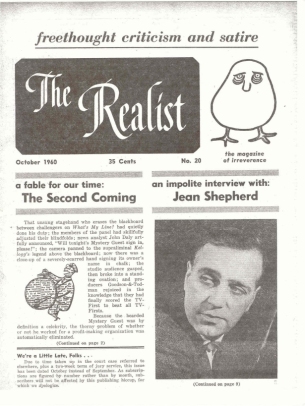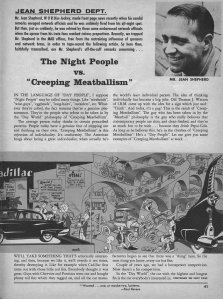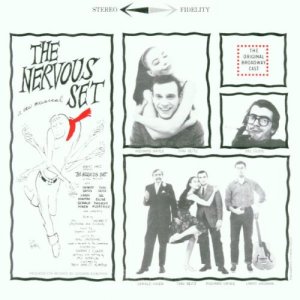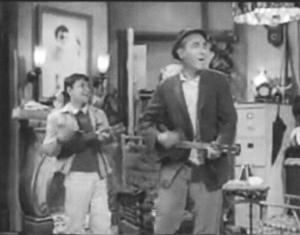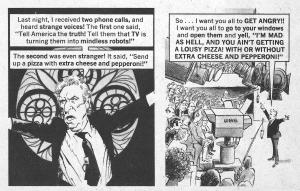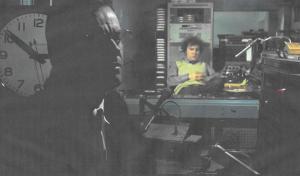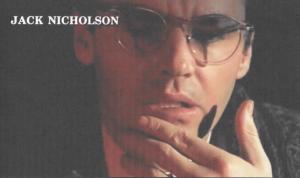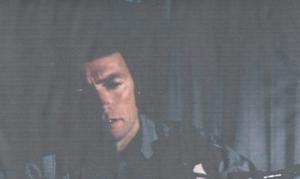Home » Radio, its Nature and its Art (Page 3)
Category Archives: Radio, its Nature and its Art
JEAN SHEPHERD–Obdurate Acts, Extenuating Circumstances (4)
THE SHEPHERD’S LIFE
A Tragedy in Obdurate Acts
and Extenuating Circumstances
♦
Consolidation
Why and how he was switched from the more innovative overnights (at the NJ transmitter) to the in-studio, earlier-in-the-evening slot, is unknown. That he seemed to have retained the impetus of the overnights into Sunday evening, is a major victory. He seemed to have retained the slow and easy-going style of the overnights (I’m assuming this, as the following, much shorter broadcasts are of a different kind–still seemingly loose, and definitely improvised, but a bit less free-flowing.) That this schedule gave way to those earlier, 45-minute weekday segments, also represents a change that resulted in a different kind of show with its own very high-quality use of the radio medium.
My chart, shown in the previous post on the subject–as well as in a much earlier post–shows the difference in his career trajectory. Most noticeable in the programs themselves would seem to be the much larger percentage of school-age listeners and what I observe is the absence of contemporary jazz.
Many prefer his more refined and organized, 45-minute improvised radio to his long, Sunday evening, looser style. There is something easier to take, more conventional, more traditional as art and organization in his 45-minute style. He recreated himself, and that is a great accomplishment. The variety from night to night over about seventeen years is a marvel to behold. His commentaries, wit, philosophical bits and pieces, his cuckoo musical interludes with jews harp, nose flute, kazoo, and head-knocking, his stories that seem both improvised and sometimes, somehow well-formed, coming out just right at the end of the show. We revel in the variety, the unexpectedness, the mastery.
Comic strip artist Bill Griffith, in his “Zippy the Pinhead” tribute, expresses it well: HIS WIT WAS LIKE A LIFE RAFT TO ME. I CONFESS…I WAS A CULTIST…AND JEAN SHEPHERD WAS MY GURU. WHO KNOWS WHAT DEEP SUBCONSCIOUS EFFECT HIS LATE-NIGHT LOQUACIOUSNESS HAD ON ME…?
The large influx of high school and college listeners was a good thing as far as sponsorship was concerned, and Shepherd also enjoyed the adulation. But he did not so much like the intense crowding of his personhood that such cult-like celebrity brought.
As I’ve suggested before, I believe that, despite such masterpieces of his post-1960 WOR days as: Eulogy of JFK; Morse Code and Mark Twain; March on Washington, etc., Jean Shepherd’s creative heights leveled off at the very high standard he maintained for another decade-and-a-half.
Stay tuned for Part 5 of
THE SHEPHERD’S LIFE
JEAN SHEPHERD–Obdurate Acts, Extenuating Circumstances (2)
THE SHEPHERD’S LIFE
A Tragedy in Obdurate Acts
and Extenuating Circumstances
In childhood and youth, Jean Shepherd encountered some little realities (no desks in kindergarten, not getting his name right!–oh my!) He discovered the joy of words and art. In his time in college he had two major epiphanies–snails and cars can give one important life-lessons. Among his early adult experiences in the army, he said that his training in Camp Crowder (aka “Camp Swampy” as it’s named in Beetle Bailey) made him a man.
•
Tadpole Dreams and Aspirations
Soon after the war, he began his radio career in such lesser locations as stations in Cincinnati and Philadelphia. He referred to these early times as his tadpole days. He honed his skills by talking “too much.” With the early history of radio’s dominance across America and his skill with improvised words, he had dreams, he had aspirations.
To me it’s the most romantic of all the media. Fantastically romantic medium. I’ll tell you some night.
At night I’m working in a radio station, see. I’m doing all these things. I’m doing these things–and slowly, by tiny, tiny inchings, my fame grew. I’m doing the English cut-ins on a Lithuanian man-on-the-street broadcast. After that I was given my own program. A program that was heard every morning at 5:30 AM. A program of Elmer Rhode Heever hymns–recorded–in which I did the commercials in between. I was beginning to inch my way up and up and up. Inch by inch. Moment by moment it looked like any day now–the next assignment I was Cousin Jean on a hillbilly teenage program when I had to talk like this [Imitates accent.] I was beginning to really feel it. I mean, you know, I was “tearing a side.”
I was just beginning to see that there was a world out there. I mean that there was something beyond Western Avenue, I was beginning to understand that–that out past Howard Street there was something. And it was beginning to erode me. This city [New York] is the worst seducer in the world. It erodes. It cuts and digs and grinds….Well, I got this special delivery letter. It said, “Dear Mr. Shepherd, I own a string of radio stations in Alaska. We would like you to come up and run our Juneau radio station. We will provide you with a cabin.” A cabin!
And every one of these guys who were doing things like the Elmer Rhode Heeber Gospel Hour, and guys who were doing the English cut-ins on The Croatian Hour. All of them looked at me. “What are you doing this ridiculous thing for?”
“Well, look at this–Alaska! Alaska!”
“Are you out of your mind?”
I said, “No, look around. Listen. Here we’re in this little dark radio station with the liana vines growing up the side, and the old Wayne King records that we play over and over and over again.”
Three of them looked at me with one eye, and all three of them said, “If you go anywhere, man, the only place to go–New York!–I mean, the Big Apple–that’s the big time! You can stand right next to Andre Baruch, right up there with Frank Gallup, with Kenny Delmar!”
And all the while the Bing Crosby record was going, “You and me, and blue Hawaii, da de a do do do do.”
I looked at the three guys and I said, “You’re right!”
Yes, Jean Shepherd knew that they were right. Beyond his tadpole experience in his early radio days, with what sources of nourishment and knowledge was Shepherd equipped to create a name–and a persona–for himself in New York? The Midwest storytelling tradition and style. Extended stories that create a narrative environment for insights he wanted to convey to amuse and instruct through context and humor. Mark Twain, George Ade, W. C. Fields, Jack Benny, Paul Rhymer’s Vic and Sade. No more “You and me, and blue Hawaii, da de a do do do do.” He was on the cusp of burgeoning. Evidence refutes the story that he would go to the Big Apple to take over as host of the Tonight Show. He would go to New York to be on the radio. He would burgeon.
Portent: That Andre Baruch, Frank Gallup, and Kenny Delmar are not currently names widely celebrated, or even widely known, does not tend to bode well for radio-based aspirations.
•
I believe that Shep’s faults and failure (despite his genius) to achieve universal renown to the height he believed to be his due, rise to the general classic level of tragedy. Read my first post on the subject and my upcoming posts (every other post on a subject, as is my custom) and give me some feedback, please, especially as I proceed with later posts in this series.
Stay tuned for Part 3 of
THE SHEPHERD’S LIFE
_______________________________________________________
JEAN SHEPHERD & ANDY KAUFMAN again. Part 1 of 3
There’s no way to describe what I do. It’s just me. —Andy Kaufman
When I perform, it’s very personal. I’m sharing things I like,
inviting the audience into my room.
—Andy Kaufman
“Andy’s gift was not his talent or his skills-it was his genius,
the genius of what he dared.” –Judd Hirsch
“He made it virtually impossible to distinguish between
his performing and his life” — Steve Bodow
The above, with some slightly differently translated words,
might well be attributed to Jean Shepherd.
I first posted on Shep and Andy on April 12, 2014. (You can find it by clicking on KAUFMAN, ANDY in the list near the left edge of this blog.) There may be a bit of repetition between that earlier one and these current three–I think that reading them all together might be the best way to gather what I hope to express about Andy Kaufman–and the artistic comparison with Shep. I’ve recently become (additionally) obsessed with Andy and I want to write about him to confirm, as far as possible, my own understanding of what Andy is and in what ways I vibrate to his essence. (Actually, I hope to understand better what his essence is.) I do believe there is something of value to fix in my mind in a communicable form regarding connections and differences between Shep and Andy. I hope I can find and articulate them. I discuss here only the radio-Shep because I believe that it is there that the two are most closely aligned.
♦
Truth
Jean Shepherd often captured our interest by telling us truths that he encountered and that we probably never realized were true, and he told them in unexpected ways—we are unexpectedly confronted by them and this little shock of recognition is often where the humor and our smile come in.
Shep
A major aspect of one’s attachment to Shepherd is the sense that he is “telling it like it is,” truthfully in a way that few others can or do. There is also very much the feeling that Shepherd is speaking directly to the listener as a friend, and not doing a performance (even though in later years, commenting on his radio work, he said that he was indeed, a performer and a fictional-story-teller). Shep’s stories (and even his comments?) had us bamboozled into thinking that they were all true.
Andy
Andy in public (dare I accurately say “in performance”?) often presents himself, giving a real sense that he is being the way he really is—truthfully, in a way that no one else does—that he is what one sees and that he is not giving a “performance.” The more I see and understand Andy, the more I’ve become aware of this aspect of his public persona.
•
Andy Kaufman often disturbed us by poking us in the ribs in a way that we might find at first unpleasant, but which, upon reflection, we realize has fooled us by exposing our own mistaken or limited sense of reality. What an extraordinary experience it must have been for those who, not knowing Kaufman’s “act,” first saw him do his imitations as the “Foreign Man.” At the beginning the audience laughs at him–all the more powerful then, when he transforms himself into Elvis.
“Now, but not to be the least,
I would like to imitate
the Elvis Presley.”
“Dank you veddy much!”
With his innocent-sounding foreign accent, he says he will do imitations. He does a very unfunny one of Ed McMann, and we laugh not at it, but at Andy (“Foreign Man”) for being so awful at it. We feel superior to him. He does one of Archy Bunker, equally bad and we again, with our feelings of superiority, laugh at Foreign Man’s innocence/ignorance. He says he will imitate Elvis and we again expect the worst possible imitation–an oafish result. We are shocked when we find that his Elvis is extraordinary. He has become Elvis. Andy has played with our minds and expectations. He ends by accepting our applause, but not as performer Andy Kaufman—he confounds us again—he switches our expectations by changing his perceived persona, again being Foreign Man with his “Dank you veddy much!” He is not Kaufman, the performer, who thanks us for applauding–it is Foreign Man who has done the great Elvis imitation thanking us! Andy imitating Foreign Man imitating Elvis.
Jokes
Time Mag: He is continually questioning then undermining the idea of what is funny. “Andy takes a lot of risks,” Zmuda [AK’s associate] says. “What performer in his right mind would go onstage and deliberately bomb?”
Shepherd often commented that his presentation was as a humorist, who builds up a story or commentary slowly, expressing some aspect of the human condition, and that the humor grows out of the situation, maybe producing laughter, rather than telling a joke as do comics. “Well, comedy is a process whereby you’re aiming at making a person laugh, and the end product is the laugh. With humor however, the laugh happens to be the byproduct of what you’re doing.”
Shep said: “There are guys who tell jokes, and those who don’t. I am not a teller. I can see the humor in the world. I deal in humor but I can’t tell jokes. I have never told a joke successfully, ever.”
Kaufman insisted that he was not a comedian—he did not tell jokes. Andy said: “I never told a joke in my life.”
Aspects of this similarity between Shep and Andy may well be why, in Was this Man a Genius? a book of interviews of Andy by Julie Hecht, he said: “I don’t think any sense of humor is funny. Rarely. Jean Shepherd is funny.”
In another one of Andy’s successful strategies to confound his audiences, he created the obnoxious lounge singer, Tony Clifton. Once a good percentage of his enthusiasts were aware that Tony was actually Andy, while his audience, watching “Tony Clifton” on stage and thinking they knew the truth–that it was really Andy–he double-crossed them by appearing as himself while someone else was doing the Tony imitation.
 Andy Andy or someone else as Tony Clifton
Andy Andy or someone else as Tony Clifton
Doing his best to make audiences dislike him, he began wrestling women. He crowned himself Inter-Gender Wrestling Champion.
Why was Andy a Shep enthusiast? How was Andy inspired by Shep? Because Shep projected a sense of his real self. Jean Shepherd endears himself to us by being honest, perceptive, telling it like it is, a mentor—real. Andy Kaufman forces unexpected reality upon us by messing with our minds—by making us feel uncomfortable. They both tickle our minds, but in different ways.
One of the ironies in Andy’s professional life is that the Taxi people wanted his “Foreign Man” persona in the sitcom. Accepting the gig, Andy was forced to accept his character being hijacked into a rigid script, saying lines that he had not himself created. That is probably one of the reasons that Andy was so annoying to the others involved in producing that show. It’s said that the feature players complained strongly about Andy’s behavior at the time–but after he died, they seemed to be reconciled to his behavior because they recognized the quirky genius behind what he had put them through. It’s said that Andy, to get out of the straight-jacket of Latka, got Taxi producers to have Latka sometimes afflicted with “multiple personality disorder” so that Andy could enact other characters on the show.
Andy as Latka Gravis in Taxi
Unless otherwise noted, the quotes from Shepherd are from his radio shows;
the quotes from Kaufman are from http://www.andykaufman.com and other sources.
•
Stay Tuned for Dead Andy & Dead Shep
( aka “Live Andy & Live Shep.” )
___________________________________________
JEAN SHEPHERD–and JAMES SALTER
“The euphemism ‘writer’s writer’ has been applied so many times
that Salter visibly recoils at hearing it.
(‘That means nobody knows who you are,’ he told me….)
.
He admits that he writes with specific people in mind, but “enhanced a bit; not necessarily made more admirable, just made clearer or more appropriate to their role. You say, ‘Come backstage here just for a minute. I’d like to fasten this part of your coat—it looks a little funny when you turn profile—and then you’ll be ready to go.’ That’s about what it’s like.”
–Above, both from the Village Voice interview by Scott Foundas, 3/27/2013
•
James Salter, a ‘Writer’s Writer’ Short on
Sales but Long on Acclaim, Dies at 90
I daily note the subjects of the New York Times obituaries to see if someone I know of has died and to see if the main subject of the article interests me. I learn a lot that way. On June 20, 2015 the heading of the major obit struck me because I have a strong interest in literature, though the name Salter is only vaguely familiar to me and he never wrote anything read by me (my own construction–I’ve waited years to have the opportunity to use it). Besides, the “short on sales but long on acclaim” aspect in the heading struck me as possibly similar to Shepherd.
The obituary, by Helen T. Verongos, grabbed me–from beginning to its last words–for its thoughtful and sensitive elegy of sadness at the desire-to-achieve and its appreciation of what had been achieved. Indeed, I recognized similarities to Jean Shepherd’s life, aspirations, disappointments, and achievements. Quotes from the obit I record in bold type indented, and my comments are in standard type, full-width
James Salter, whose intimately detailed novels and short stories kept a small but devoted audience in its thrall died on Friday….
James Wolcott described him…as America’s most “underrated underrated author.”
“Small but devoted audience in its thrall” and “underrated underrated” seem especially appropriate regarding Jean Shepherd. The following comment rings a bell regarding Leigh Brown, acting as Shep’s agent, having to seek publication elsewhere when Doubleday, publisher of his first two books, turned down his The Ferrari in the Bedroom, and I, erstwhile promoter of Shep for publication, struggle with a certain amount of agony, to get my two more book manuscripts of Shep transcripts published. Salter’s publisher turned down a novel manuscript and only through a fellow-author’s influence did his A Sport and a Pastime achieve publication, subsequently highly regarded:
The print run was small, and the publishers, Mr. Salter said, “were holding it like it was a pair of dirty socks.”
Bringing to mind Shepherd deserting his family in the blandings of New Jersey for the creative ambiance of Greenwich Village, is Salter’s way of dealing with suburban family life:
Living in the Hudson River Valley, he did his writing in New York in a room in Greenwich Village, where he befriended artists but felt himself to be their inferior. “I was from the suburbs,” he wrote. “I had a wife, children, the entire manifest. Even in the city I found it hard to believe I was working on anything of interest.”
That, indeed, seems to be what Shepherd feared and avoided–with his apparent heartless abandonment of his family.
The obit mentions several important literary prizes that Salter won, reminding one of the many that Shepherd also won–yet which didn’t satisfy their longing for even more and better.
Describing Salter’s 1997 memoir, Burning the Days, the obit continues:
Though autobiographical in style and substance, it is almost indistinguishable from his stories, in keeping with Mr. Salter’s often-stated refusal to believe in the “arbitrary separation” of fact and fiction.
Not quite as Shepherd might have put it or admitted, but it probably indicates a shared affiliation they both had for the uses that their facts-into-fictions enjoyed. Early on (in a reminder to Shep fans of their hero’s desires), the obituary comments that:
But he never achieved the broad popularity he craved.
The obituary ends on a warmly considered comment on a creator’s legacy (Salter’s, and, Shep-enthusiasts should think, also of Shepherd’s):
…the book [his final novel] did appear on The Times best-seller list for a week, but never achieved the success he had hoped for.
At the end of his life, his legacy mattered. As Mr. Salter once wrote, “Life passes into pages if it passes into anything.”
Yes, Shep fans remember his comment on our penultimate fate: “Can you imagine 4,000 years passing, and you’re not even a memory?” Yes, Shep, but even worse, what about beyond that by a couple billion years–when the Earth spirals down its orbit by plunging into the sun. But please, don’t let that stop anyone from fighting the good creative fight here and now!
____________________________________________
JEAN SHEPHERD– Wimpy Kid?
NEW (WIMPY) KID IN TOWN
Diary of a Wimpy Kid and its many sequels as kids books (originally composed with adult readers in mind, so the author says) have, reportedly, 150 millions copies in print and been made into a movie. An article about him in the NY Times says “the illustrated diary of an acerbic and devious middle-school boy named Greg Heffley. The stories were semi-autobiographical, loosely based on Mr. Kinney’s childhood and ‘put through the fiction blender.'” Thus, author Jeff Kinney’s work would seem to have some similarity to Shepherd’s.
I’ve skimmed this first volume and find it witty and well done, though not, as it claims on the cover, “a novel.” (Remember that Shep’s IGWT is described on the cover–and by Shep himself–as “a novel.”) Wimpy does follow the kid through his first year at middle school, seems not to have the structure of a novel, but, indeed, has, one after another, dozens of individual bits and pieces, each quite good as stand-alone, funny vignettes. They do add up to a volume that keeps one’s interest through funny little episodes and funny kid-like comments by the wimpy kid.
Neither does the book seem to be told through the drawings on every page (Described on the book cover as “cartoons.” The drawings are really very funny illustrations to the text. Altogether a well-done creation.
Does author Kinney have any acknowledged debt to Shepherd? I hope to find out.
An interview by David Hiltbrand posted online in March, 2010, comments. “Jeff Kinney had a clear template when it came time to adapt his wildly successful Diary of a Wimpy Kid children’s books to the big screen. ‘I went right to A Christmas Story,’ says the author, citing the 1983 film based on the stories of radio humorist Jean Shepherd.‘ ‘In most kids’ movies, the stakes are very high,’ says Kinney, 39, in Philadelphia this week to promote the movie, which opens March 19. ‘The world is going to end or somebody is going to die or something awful is going to happen unless the characters do such and such. In this movie the stakes are incredibly low. There are two friends who break up and you want them to become friends again. In A Christmas Story, the stakes were perhaps even lower. A kid wants a BB gun. We kept reminding ourselves when we were working on the film that you can tell a good story even on the big screen with really low stakes as long as the emotional part of it works.'”
In another interview he says, “I see my books as joke-delivery mechanisms. I’m trying to get as many laughs as I can per page. And if I can figure a way to get a good story out of it or something credible then I’m very satisfied, but really, I’m trying to keep the kid laughing, and often, if I have a lot of plot, it gets in the way of the joke and it burns through too many pages so I will sacrifice a good story for a good joke any time.” So we see that his intention is not the same as Shep’s long-form humorous tales (Though A Christmas Story, not a Shep-alone but a joint-creation, is constantly laugh-out-loud funny for me and my wife every time we see it.)
By the way, I also like the weird, kid-like drawing style of Wimpy Kid–it also has its appropriate, funny look to it.
Kinney is opening a large, independent bookstore in his home town. He’ll have a special spot for all the Wimpy Kid books and ancillary, money-making by-products.
Imagine how envious Shep would be regarding all this!
(Although there’s no focus on Shep’s total creative output
at the A Christmas Story House’s store,
maybe it’s the best we should expect.)
•
____________________________________________
JEAN SHEPHERD: Audio Books
A couple of months ago, a New York Times front-page article appeared regarding audio books, noting that, “The story was conceived, written and produced as an original audio drama for Audible, the audiobook producer and retailer.” This might indicate an increase interest in audio stories–such as Shepherd’s radio stories (and maybe his other broadcast material).
The article goes on: “Some see the current audio renaissance as a modern version of the Golden Age of radio drama….”
Shepherd sometimes talked about his view of how the whole world of storytelling on radio had so soon faded from away after a relatively short life:
It’s sad that a whole art form grew to fruition and suddenly disappeared. It would be as if somebody had invented painting and great painters had flourished for—oh, maybe twenty years and then everybody forgot about painting because everyone discovered ceramics. Or they discovered sculpture and—they—they just completely from that day on—because radio can do things that television and the movies and the stage can never do. It plays with the imagination and the mind [in a way] that I think no other medium can ever approach. 
Yet the whole idea of radio acting—you know some great radio actors who in their field were as fine as, and in many cases even better than, anybody performing on Broadway, anybody performing in the Shakespearean repertory today. Some great actors rose to become really fine artists in the field of radio back in the 1930s and early 1940s. And the whole— the whole canvas is gone now. The whole thing is gone. It’s really a shame because this was a fine medium and is—it’s as though there was a big sleeping giant out there. A huge, sleeping giant that’s lying out there, that one time people hunted, that one time excited people and has now long since somehow been forgotten by the people. And it’s lying out there in the jungle there, just—just completely untouched as though it’s a whole new mind-land, let’s say, a universe of the—of the psyche is lying out there untouched, and will be untapped. (See my EYF! pages 97-98)
Shepherd (and others) had defended the special attributes of radio for creating a reality. The Times article quotes: “‘You can create a picture in your mind with sound that’s every bit as vivid as a movie,’ said the novelist Joe Hill,…’A lot of filmmakers who work in horror say what’s really scary is hearing, not seeing.'” The article also notes that, “Some are shunning the term ‘audiobook’ and trying to rebrand their content as ‘audio entertainment’ or ‘movies for your ears.” A new way of promoting audios, says the Times, is to”blend the immersive charm of old-time radio drama with digital technology.” This means incorporating sometimes considerable sound effects, music, varied voices, etc.
•
[Shepherd very much enjoyed the Paul Rhymer radio sitcom, Vic and Sade.
It played with the small minds and incidents
in American life.
Maybe not a serious example of great acting (?).
But exceedingly witty.
The main characters were Victor Gook, Sade Gook, and son Rush Gook.]
Vic, Sade, author Rhymer,
and one of the Rush players:
Art Van Harvey, Bernardine Flynn,
Paul Rhymer and Bill Idelson.
•
The Times quotes Jeffrey Deaver, described as a “lawyer-turned- thriller writer,” to end its article thus: “There are so many time-wasting alternatives to turn ‘The Starling Project,’ into a traditional book.” Deaver is hoping the project will help him: “This is an easier way for people to get access to good storytelling.”
Shepherd created his audio art with only his voice, and maybe a bit of crinkling paper or desk pounding–maybe he would have approved this technologically enhanced form of sound-in-stories.
Or maybe not.
________________________________________________
JEAN SHEPHERD Night People and “The Nervous Set.”
HIP AND “NIGHT PEOPLE”
It appears from circumstantial evidence of his early activities in New York, that Jean Shepherd was the essence of “hip.” With the change to shorter programs earlier in the evening, he probably didn’t seem as hip except in the minds of what was becoming his predominantly younger audience. He remained extremely intelligent, knowledgeable, entertaining, and sometimes arcane, but not what the cutting edge of hip would still call hip. (Don’t get the impression that I was ever hip—the most I can claim is that because of Shepherd’s recommendations I was an early and long-time subscriber to The Village Voice and The Realist.
As a member of the “predominantly younger audience,”
I found Shepherd hip then, and, in a modified way, I still do.)
Yes, Shepherd was hip, so he must have been aware of and curious about the nature of a Broadway musical of 1959, The Nervous Set. Based on an autobiographical novel by Jay Landesman, with lyrics by his wife Fran Landesman, it seems a witty, cynical send-up of both the hip and the square. With characters said to portray Jack Kerouac and Allen Ginsberg among others, set in New York in 1950, it’s described as “the intensely cool, hopelessly hip jazz musical about the Beat Generation,” and “a loving evocation of the Beat Generation, with all its warts and contradictions,…”
Connections to Shepherd include his affinity for the Beats, his friend Jules Feiffer’s promotional artwork for the play, and more directly, by one of the songs. Titled “Night People,” it repeats Shepherd’s “night people” phrase, which he’d used at about four years before the play opened. The phrase had been in the air since Shepherd described characteristics of people who were awake in the middle of the night, and who were by implication, his early hip radio listeners. [Actress Lois Nettleton, eventually Shep’s third wife, was one of those early listeners.] Although I’ve suggested the following before, I’ve never fully articulated it. My sense of Shepherd’s use goes something like this:
1) In early 1956, when he broadcast nightly from 1:00 to 5:30 A. M., he must have begun referring to those who were awake late at night, and many of whom listened to his program, as “night people,” giving the sense that they were a special breed who, through inclination, occupation, or other imperative, felt more comfortable in the dark, less-inhabited hours, when they could be more open to their less-conforming temperaments. He may have put it a bit too strongly, specifically referring to a “wild tossing of the soul and brooding.” Yet even these tendencies would have been found among the rarified and embattled souls whose affinity toward Shepherd’s style and tone led them to cling to his word as balm and sustenance. Ah, those lucky few who heard him then!
2) Then came the firing/rehiring of September 1956, when the renown he thus achieved and the Sunday evening hour, promoted a larger audience, including an intelligent and perceptive majority of them maybe not brooding with a wild tossing of their souls, yet (ready for a pun here?) attuned to him and more likely seated at the kitchen table, homework done, listening on a maroon plastic Zenith AM/FM radio with its big, simulated-gold dial (See my EYF! page 18).
With this audience, he must have seen the need to expand the meaning of “night people,” so in part he promoted an aspect of it, a distaste for what he called the “creeping meatballism” of the mass culture’s conformist and consumer-oriented pressures. Near the beginning of the earlier-in-the-evening broadcasts (beginning in September, 1956), his article, “The Night People vs. ‘Creeping Meatballism’” appeared April 1957 in that phenomenon of kid-revolt against the conventional culture and consumerism, Mad Magazine.
In the article, he referred to Night People as “…people who refuse to be taken in by the ‘Day World’ philosophy of ‘Creeping Meatballism.’” For “day people,” read “conformists.” At the end of the article, he gathers all perceptive Mad readers and potential listeners into his arms, commenting that no matter how consumer-addicted, one is still an individual, and “every one of us, I don’t care who he is, has a certain amount of ‘Night People’ in him. And once a person starts thinking and laughing at the culture,…he can never go back!” Indeed, who of us ever went back?
3) By the time he began broadcasting earlier in the evening, although he may have continued to suggest that his listeners were “Night People,” he didn’t use the term as originally defined but left its understanding open to wider interpretation. I asked Shepherd fans about his post-overnight usage and reports suggest that later acolytes were not referred to as afflicted with a night person’s wild tossings. Personally, despite a bit of sleep apnea with mild limb movement, I’ve never tossed wildly.
Without being able to listen to any–much less all–of Shepherd’s overnight broadcasts, we can’t know the whole truth, but in numerous articles the media promoted Shepherd’s use of the term. An interviewer in 1964: “You referred to your audience as ‘night people.’” Response: “Well, not really. That’s not as simple as it sounds. In fact the phrase ‘night people’ came out of that show that I did. I never called my audience ‘night people.’”
In response to my 2006 query by email to The Nervous Set’s author, Jay Landesman, he neither confirmed nor denied a connection between Shepherd’s use of the term and the song, but merely promoted to me an expected new production insipidly re-titled Fun Life. (It never happened.)
LP recording. Note Feiffer drawing on left.
The song can’t be interpreted as a positive comment on what Shepherd meant by the phrase. The ironic and pompous orchestration and the original cast’s ironically smug rendition make it a two-edged sword—putting down both day-people blandness along with the play’s idea of night people who have a superficial enjoyment of such stuff as neon lights. Certainly the lyrics of the song don’t evoke what Shepherd felt were serious, highly intelligent, and sensitive people seeking solace, if not fulfillment, in the night. The song refers to the night people as “restless neon light people, the bright people.” Sneering at “sober little clay” day people because they never have time to play, the song ends with “We always run before the sun can spoil our fun. Because we’re night people. Night people. Night people.” Listen to it here: https://www.youtube.com/watch?v=EsKc8i8yOx4
The impression is of superficial, late-night party animals. Neon lights and the lyric’s tinsel stars have nothing to do with the Beats or Shepherd’s term. We know Shepherd disapproved of superficial uses of his phrase, as indicated in the broadcast segment below. He must have been incensed at the distortion of his idea and the use of the term, and he might well have been referring, at least in part, to the play here—his comment occurs within about a year of the play’s opening:
And you know, incidentally, it has bothered me so much what has happened to the term “night people,” which I have always regretted coining. This was a term which I coined, and I will stand accused and guilty of it. And I notice that people have taken it up and used it to cover all sorts of sins of omission and commission. It has nothing to do with Walter Winchell’s world of bus boys—nothing to do with Walter Winchell’s world and Damon Runyon’s world of cab drivers. This is not the night people that I’m referring to.
I’m talking about people with that wild tossing in the soul that somehow makes them stay up till three o’clock in the morning and brood. (June 4, 1960)
________________________________________
JEAN SHEPHERD and his theme song, etc.
Marc Spector, who had been working for WBAI, was hired as an associate producer to work with Jean and Leigh Brown at WOR during 1974-5. They were traveling a lot in those days and needed someone to handle the show while they were away. Part of Spector’s job was to work in Shepherd’s tiny WOR office space. He remembers the heavy ten-inch tapes on metal reels of previous Shepherd shows stacked up there. Spector kept a log of every show and they were documented extremely thoroughly with handwritten notes on the tape boxes, including an identifying title for each show on almost all of them. (Because these original tapes seem to have been lost or are unobtainable, current program names are not those original ones, but are those made up years later by people who recorded the shows off the air or by those, such as Max Schmid, who later distributed the copies.)
Spector remembers that Jean was “rarely in the studio when the theme [music] started. He usually was still in the control room and he’d usually say, ‘hit it.’ He would stay as long as he could in the control room because he was talking to the engineer, trying to engage him, trying to get something going, trying to get an idea—feedback—and sometimes the theme would be running out….And you could not say to Jean ‘Twenty seconds. You’ve got to get in the studio.’ And that’s why, if you notice, there’s no consistency between where he starts his monolog over the theme.”
I suggest a different cause for the differing times when Shepherd would begin or stop talking during his opening and closing theme. Note that Shepherd was equally varied in when he ended his monolog—sometimes when the end theme began and sometimes during the final musical notes. This variation was consistent with Shepherd’s easy-going style, and more than likely he played with this variation, this element of uncertainty, not because he was otherwise occupied, but that he allowed it to happen on purpose, just for the fun of it. When he began and ended his monolog during the theme probably related to Shep’s wanting the beginning and ending of his shows to be part of the uncertainty-factor in his show’s content. When he ended his talk during the end-theme, probably had to do, at times, with how much he felt he still had to say during that program. *!
In discussing how unusual Shepherd’s style was in relation to the rest of WOR’s morning and afternoon chatting couples who appealed to an old-fashioned, conservative, coffee-klatch crowd, Spector suggests that when Shepherd made fun of little old lady listeners who might be critical and find his program objectionable, he was taking a swipe at the WOR’s audience for the rest of the talk-program schedule.
“Martha Deane” was the entertainment name for several WOR
talkers who used it over the years. “Dorothy and Dick” was the
WOR couple Dorothy Kilgallen and Dick Kollmar, who talked:
‘Nough said.
•
*! “Anonymous” has this to add:
< I do remember him commenting that the theme was also a sort of game he played for his own amusement, that he knew there were listeners trying to record the whole theme . So he said that at some point he would always interrupt it just to drive the would be recorders crazy. I vaguely also remember him letting it go through completely at least once.> See comments for this post for the entire comment.
____________________________________________
JEAN SHEPHERD—TRAVEL BOOK (Part 2 of many)
The previous post contained a proposed cover for a book of Shep’s travels. I continue with more of the book’s “front matter.” You’ll note that some “Chapters” contain various parts–each part is a separate, extended travel narrative.
•
[Frontispiece]
•
by the same author
SHEP’S ARMY: BUMMERS, BLISTERS, AND BOONDDOGGLES (2013, Editor, Introduction)
EXCELSIOR, YOU FATHEAD! THE ART AND ENIGMA OF JEAN SHEPHERD (2005, Author)
•
[Dedication]
For all those who listened, recorded, and distributed
Jean Shepherd’s travel narratives so that we may follow him.
•
[Epigraph]
“I have traveled around the world a couple of times and I’ve been many places. I’ve been to the regular places that the usual American tours. To me the tourist is on a very different kind of journey than a traveler is on. A traveler is usually an ex-tourist. There’s a big difference between the two though. He is not going after the same thing….After having traveled for a couple of years, I became a traveler. I found myself looking at a country with a knowledgeable eye.” –Jean Shepherd
•
Acknowledgements
•
[Introduction]
Traveling With Jean Parker Shepherd, Adventurer
•
[Table of Continents]
CHAPTER 1. March on Washington for Jobs and Freedom, August 28, 1963
CHAPTER 2. Maine Deciding to be Beautiful
CHAPTER 3. The Middle East
a) Trouble in Beirut
b) The Negev Desert
c) Tel Aviv
d) Beersheba and The Desert Inn
e) The Bedouin’s Tent
f) Bedouin Bazaar Visions
g) Skin-diving in the Red Sea
CHAPTER 4. John, Paul, George, Ringo, and Shep
CHAPTER 5. Irish Blood in Me
CHAPTER 6. The Last Time I Saw Paris: French Farce, Le Drugstore, Riot
CHAPTER 7. Around the World with Shep
a) And Here’s How it Happened
b) Tehran and Tokyo
c) Bangkok and Tokyo
d) Tokyo: I Really Came Here For Serenity and Peace and Koto Music
CHAPTER 8. Australia
a) Sharks and Martinis
b) ANZAC Day
CHAPTER 9. Amazon and the Headhunters
a) Hey, Shep, How’d You Like to Go to Peru?
b) Don’t Go, It’s Dangerous!
c) I’m Going!
d) One of the Truly Great Experiences of My Life
e) I Guess I Came Back Changed
f) We Have Never Seen This Kind of White Man
CHAPTER 10. Nigeria
a) A Peculiar Kind of Flavor
b) Nothing Works Like at Home.
c) You are Enrolling, Please, for How Long, Sir?
d) How are You, Sir? How? Hi, hi, hi, Sir.
e) In a Year or Two He was Right in the Same Boat With the Rest of Us, You Know
f) No Matter What I do, I am an American
CHAPTER 11. Sailing the Windward Islands
a) Seafaring
b) Pig Roast
CHAPTER 12. Maine is a Foreign Country
CHAPTER 13. Travel Homilies of a Nomadic American
•
Sources of the Audios
________________________________________________
JEAN SHEPHERD–Shep tributes again
I’ve previously indicated some tributes to Shep in the media.
Here’s a bit more.
A THOUSAND CLOWNS
Jason Robards (Murray) and his nephew performing
“Yes Sir, That’s My Baby,” one of Shep’s favorite songs
to sing and play on the air.
____________
NETWORK
The tribute in the movie Network to Shep’s “hurling an invective,”
as parodied in Mad Magazine’s
illustrated article, “Nutwork.”
____________
THE KING OF MARVIN GARDENS
Jack Nicholson playing David Staebler, “a melancholy Philadelphia disk jockey
who tells long, angst ridden stories of his childhood over the radio” lives with his
elderly grandfather. An extended story he tells (shown in the closeup),
about he and his brother as kids, complicit in their grandfather’s death
by choking on a fish bone, is obviously a fabrication because,
as an adult, Nicholson lives with his grandfather.
This clear fabrication might well be a comment on
Shepherd’s stories being at least in part fabrications “based in part on his life.”
____________
“Tribute”?–or just Reference?
PLAY “MISTY” FOR ME
My recent posts discuss Shep’s relationship with this movie–
I can’t ask the two scriptwriters of the movie because both are dead.
Clint Eastwood as the late-night DJ
____________________________________________________________

















